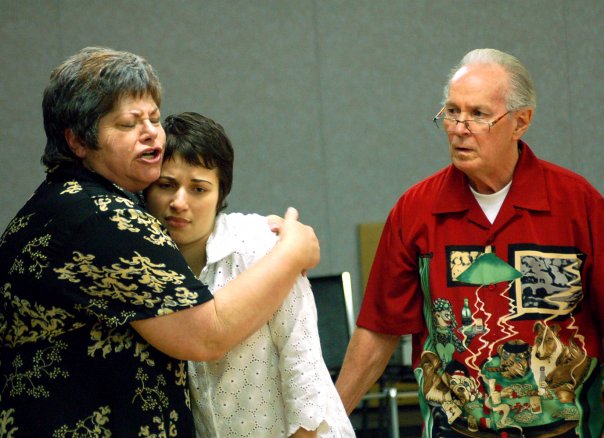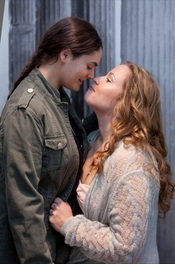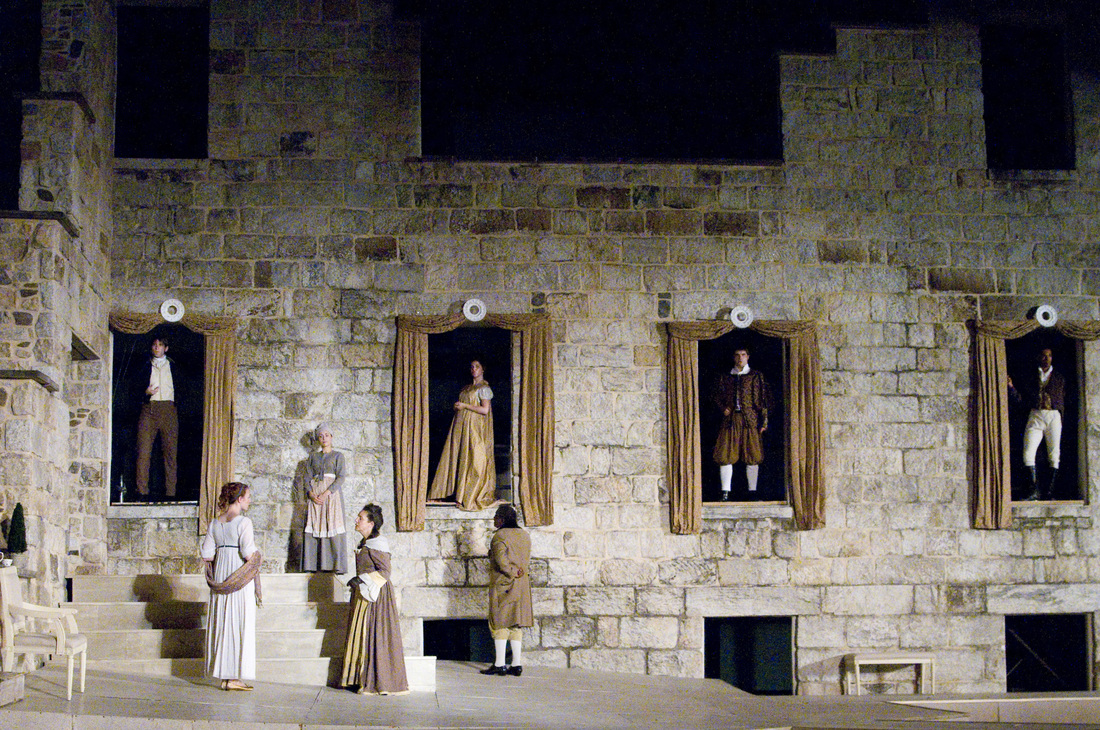|
Jacqueline Lawton: Why did you decide to get into theatre? Was there someone or a particular show that inspired you?
Ty Hallmark: I’m a lifer. I’m the kid that did the church musicals and school plays and realized I could make an audience laugh. That revelation happened when I was about 7 years old and I’ve identified myself as a storyteller, in some way, ever since. JL: What was the first play that you ever directed? What did you learn from that experience that remains with you today? TH: Although I did not know what to call it then, I did a devised piece for my senior project at Rhodes College. I gathered a playwright, a group of actors and some musicians and together we built a performance that explored my difficulty grappling with the Holocaust and the whole “why does God let bad things happen to good people” question. It stirred conversation on my campus and won me several end of the year awards. For a long time, I considered it my best work. I’m happy to have moved on but I still approach any show I direct as a collaborator - one piece of a large puzzle that creates a beautiful picture when complete. JL: What kind of work do you do to pay the bills? How do you balance this work with your work as a director? TH: I always joke that, when you included my theatre work, I have three jobs. There’s the day job that pays the bulk of the bills – I’m the Records Coordinator for an education and healthcare law firm in Washington DC. Then there are my soul satisfying/egg money jobs – from April thru October, I work as a guide for Washington Walks. I lead tours through Lafayette Square Park, Dupont Circle and, starting next year, Woodley Park and the National Cathedral. My full-time employers have always been great about flexibility, allowing me time for auditions and tech week. Several have even come to see my shows. It is a very difficult balance and, especially as I get older, I cannot maintain the constant schedule. I make sure to take breaks every year, for several weeks, sometimes months at a time and I’m more discerning about the offers I accept. I used to feel like I had to do everything that was asked of me but I’m definitely better about saying no and feeling good about that decision. In whatever capacity, as actor, director or educator, I know I’m a life-long artist so I’m no longer in any sort of rush to pack my resume. Giving myself and my family breathing room increases the quality of work I eventually sign up to do. JL: In DC, we have the Capital Fringe Festival, the Intersections Festival, the Source Festival, the Kennedy Center's Page-to-Stage Festival, the Black Theater Festival, and the Hip Hop Theatre Festival. We also have the Mead Lab at Flashpoint Theater Lab Program. Have you participated in any of these? If so, can you speak about your experience? TH: The Fringe Festival has been the backbone of my professional experience in the DC area. Before Fringe, I was biding my time in community theatre and not plugged into the scene in DC at all. Fringe changed all of that. I participated in every festival for the first five years either as an actor, director, producer or stage manager and sometimes all of those at once. There have been years when I was a crazy person and did two shows at Fringe. I met the majority of my future collaborators through these projects and nicely, some of my closest friends too. JL: How many plays have you directed in the DC area? How many of them were written by women? By playwrights of color? How conscious are you selecting plays by women or people of color when deciding your season? TH: 4.5 with another one on the way next summer. The .5 is counting my experience as an Assistant Director of Pride & Prejudice this past summer with Chesapeake Shakespeare Company (CSC). Our director, Isabelle Anderson, is generously collaborative and I was definitely not a “sit back and watch” Assistant Director in any kind of way. To date, I’ve directed one show written by a woman – an original script by the same playwright who helped with the senior project I spoke of earlier. Coming into directing as an actor, I think I gravitate toward plays that have great roles for women regardless of the playwright’s gender. I’m looking forward to working with a diverse population of artists in the future though. That’s one thing I truly love about living and working in DC. JL: How do you feel the DC theatre community has addressed the issues of race and gender parity? How has this particular issue impacted you and your ability to work? TH: It’s definitely an ongoing conversation. I see it often on Twitter and Facebook and I know the Washington Post wrote about it recently. I sense more and more that artists in DC are making opportunities happen for women and minorities. Theatre J, Forum Theatre and PinkySwear Productions come to mind. I haven’t yet felt this impacting my work directly though, as a woman, I feel it instinctively every day. I’m betting I question myself more and perhaps don’t as aggressively chase opportunities as my male counterparts. JL: If you could be direct at any theatre in DC, which would it be and why? TH: As a newbie director, this is my favorite question! Hopefully some of the powers that be are listening … I’d love to assist at Constellation or Forum Theatre. Both are inclined toward ensemble work though stylistically they are very different. I love anything Allison Stockman directs because it feels like watching her imagination explode on stage. I love the images she creates and I suspect she thinks about directing in a way similar to me. Forum chooses scripts wisely and with diversity in mind. I sense directors have a lot of freedom in staging and crafting the story. That really appeals to me. I’m also hoping I’ll have a chance to direct at CSC. I’m very drawn to their use of environment in staging and I have a few stories in mind that would fit well there. JL: DC audiences are ... TH: Enthusiastic, engaged, educated, open-minded JL: DC actors and designers are ... TH: Collaborative, supportive, wildly talented JL: DC playwrights are … TH: Ingenious, to be celebrated and showcased JL: DC critics are ... TH: Part of the conversation JL: What advice do you have for an up and coming DC based director or a director who has just moved to D.C.? TH: See theatre. Assist. Self-produce. Go to an open rehearsal. Direct a reading. Sign up to audit a cattle call audition. Be part of the social media conversation. Ask a director you admire to meet up for a drink and a chat. We’re a very welcoming, integrated community and we love new ideas and passions. JL: What's next for you as a director? Where can we keep up with your work? TH: Well, first I make a return to acting. I’ll play Sylvia in CSC’s Two Gentlemen of Verona directed by Patrick Kilpatrick. I’ve been cast in this role for literally two years so I’m excited to get it off the ground. After that I’m directing a series of Chekhov’s short scenes for Pallas Theatre Collective. It’ll go up at the Fringe Festival in July and then have a short run at DCAC in August. I’m also involved in a long term directing project with LiveArt. Kevin Finkelstein is writing the script, titled Causality, and we’re just beginning conversation with actors. I have a website that I’m actually pretty good about maintaining (tyhallmark.com) and you can find me on Facebook and Twitter.
0 Comments
Your comment will be posted after it is approved.
Leave a Reply. |
My BlogI'm a playwright, dramaturg, and teaching artist. It is here where you'll find my queries and musings on life, theater and the world. My posts advocate for diversity, inclusion, and equity in the American Theatre and updates on my own work. Please enjoy!
Categories
All
Archives
June 2020
Reading List
|



